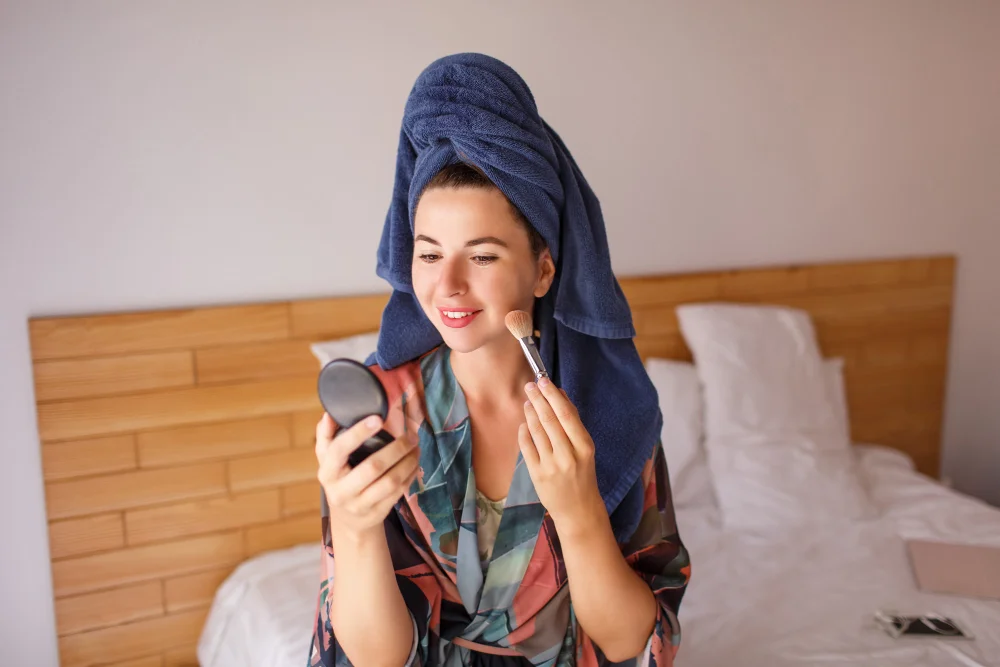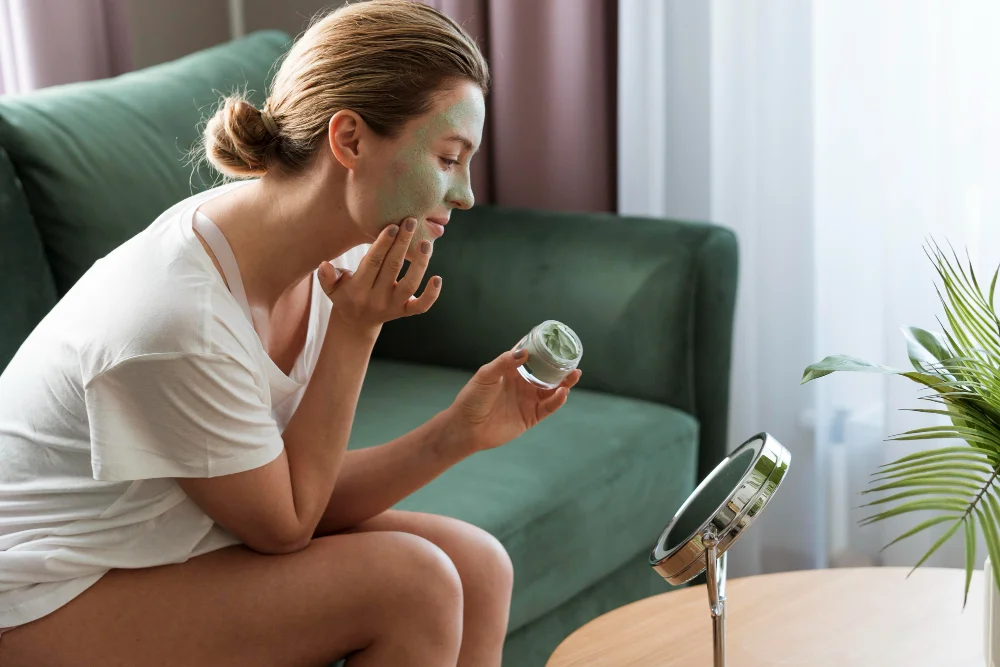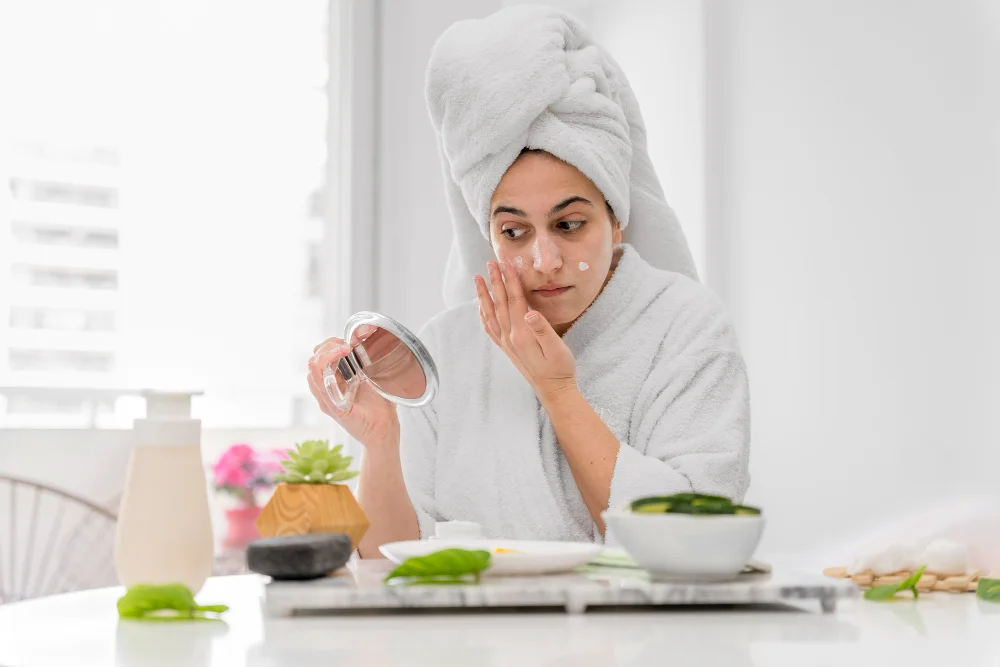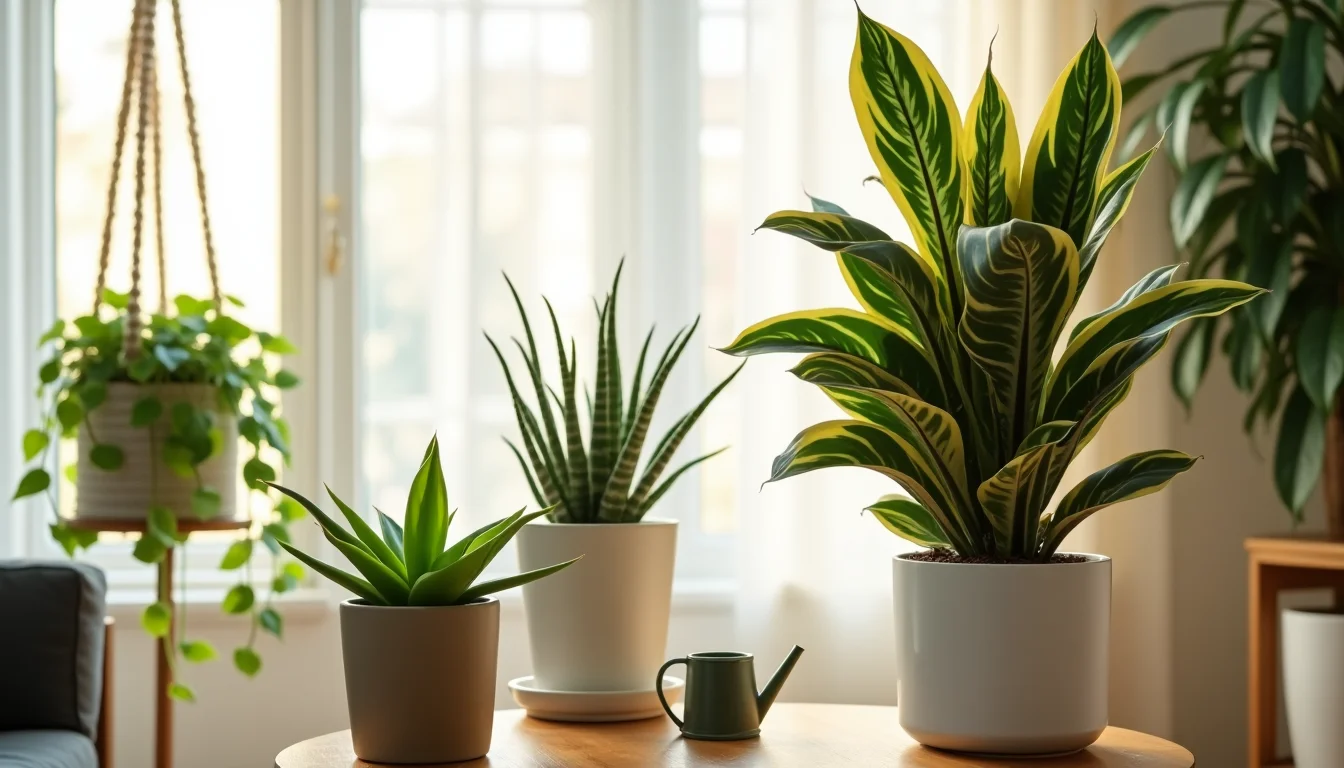Oily skin is a common skin type where your skin produces more oil than needed. This excess oil can lead to shine, clogged pores, and acne breakouts, making it necessary to have a proper oily skin routine. A well-balanced routine helps control oil, keeps the skin fresh, and prevents common skin problems. The key is to use gentle products that clean and nourish your skin without stripping away its natural moisture.
Many people with oily skin think they should avoid moisturizing or cleansing often, but this is a misconception. The proper oily skin routine focuses on removing dirt and excess oil while maintaining hydration. Consistency is also crucial because sudden changes or harsh treatments can irritate your skin and cause more oil production. Following a steady routine gives you a healthy glow and less greasy skin over time.
Having oily skin also means your skin is usually thicker and less prone to wrinkles, which is a slight advantage. But managing shine and preventing acne should be your primary goals. This article will guide you through each step to create an effective oily skin routine tailored to your needs.
Understanding Oily Skin and Its Needs
Oily skin occurs due to overactive sebaceous glands that produce excess sebum. Sebum is an oily substance that protects your skin from dryness and external damage. However, too much sebum creates a shiny appearance and clogs pores, leading to blackheads and acne. Genetics, hormonal changes, humidity, diet, and stress can trigger this.
It is essential to understand that oily skin still needs moisture. Over-washing or using harsh products may dry out your skin, which signals your glands to produce even more oil. Therefore, the oily skin routine should balance oil removal and hydration. Using gentle cleansers, toners, and moisturizers specifically designed for oily skin is the best approach.
Oily skin often has larger pores and is more prone to acne, but with the proper care, you can minimize these issues. By understanding your skin’s unique needs, you can avoid common mistakes and choose products that genuinely help.
Cleansing: The Foundation of Oily Skin Routine

Cleansing is the first and most crucial step in any oily skin routine. Removing excess oil, dirt, and sweat twice a day helps prevent clogged pores and acne formation. However, the cleanser you choose plays a huge role in controlling oil without harming your skin.
For oily skin, foaming or gel-based cleansers are ideal because they clean thoroughly and help remove oil without stripping your skin’s natural barrier. Ingredients like salicylic acid and tea tree oil are beneficial because they unclog pores and have antibacterial properties. Avoid cleansers that contain sulfates or alcohol, as these can irritate and dry your skin, causing your oil glands to go into overdrive.
When washing your face, use lukewarm water because hot water can irritate your skin, and cold water won’t clean effectively. Be gentle when massaging the cleanser in, and rinse thoroughly. Pat your face dry with a soft towel instead of rubbing it harshly.
Toning to Balance and Refresh
Toning is an essential step in the oily skin routine that comes right after cleansing. It helps to restore your skin’s natural pH balance, which can be disrupted during cleansing. A well-chosen toner also removes any leftover dirt, oil, or makeup residue, ensuring your skin is completely clean. For oily skin, toners can reduce excess oil, tighten pores, and soothe irritation caused by acne or harsh weather conditions.
Alcohol-free toners with ingredients like witch hazel, rose water, or green tea are excellent because they calm the skin without drying it out. Applying toner regularly improves skin texture, controls shine, and prepares your skin to absorb moisturizer and treatments more effectively.
Benefits of Using Toner in Your Oily Skin Routine
- Alcohol-free toners prevent drying and irritation.
- Witch hazel helps reduce oiliness and tighten pores.
- Rose water soothes redness and refreshes skin.
- Balances skin pH after cleansing
- Removes leftover impurities and residue
- Prepares skin to better absorb moisturizer
- Helps minimize the appearance of large pores
Moisturizing: Essential Even for Oily Skin

Many people with oily skin avoid moisturizer, thinking it will make their skin greasier, but this is a myth. Moisturizing is a necessary step in your oily skin routine because it keeps your skin hydrated and healthy. Without moisturizer, your skin can become dehydrated, triggering more oil production as a defence mechanism.
For oily skin, opt for lightweight, oil-free, non-comedogenic moisturizers that won’t clog your pores. Gel-based moisturizers are perfect because they provide hydration without the heaviness or shine that creams might cause. Look for ingredients like hyaluronic acid and glycerin, which attract moisture and keep skin plump.
Apply moisturizer right after toning while your skin is still a little damp. This helps lock in moisture. Using moisturizer both in the morning and at night balances oil production and supports your skin’s natural barrier.
Weekly Treatments: Exfoliation and Clay Masks
Weekly treatments like exfoliation and clay masks are essential additions to your oily skin routine. Exfoliation helps remove dead skin cells that can clog pores and cause dullness or breakouts. For oily skin, chemical exfoliants such as salicylic acid or glycolic acid are ideal because they gently penetrate pores and dissolve excess oil and impurities without harsh scrubbing. Physical scrubs should be avoided as they can irritate the skin and worsen oiliness.
Clay masks are also very beneficial for oily skin. They absorb excess oil, draw out impurities, and tighten pores, leaving your skin feeling fresh and clean. Bentonite and kaolin clays are popular choices because they detoxify skin without stripping it of necessary moisture. Using these treatments once or twice a week can significantly improve your skin texture, reduce shine, and prevent acne flare-ups, but overuse may cause dryness or irritation.
Key Benefits of Weekly Exfoliation and Clay Masks
- Exfoliation removes dead skin cells and unclogs pores.
- Chemical exfoliants are gentle yet effective for oily skin.
- Clay masks absorb excess oil and impurities.
- Bentonite and kaolin clay detoxify without over-drying
- Help reduce shine and prevent acne breakouts.
- Improve skin texture and promote a smoother complexion.
- Avoid over-exfoliating to prevent irritation and dryness.
Sun Protection: A Must in Every Routine

Protecting your oily skin from the sun is essential to prevent damage and premature ageing. UV rays can worsen oiliness, cause inflammation, and dark spots. Using sunscreen daily is a critical step in your oily skin routine.
Select a broad-spectrum sunscreen with at least SPF 30 that is lightweight and oil-free. Gel-based or mattifying sunscreens are perfect because they protect your skin without adding extra shine or clogging pores.
Even if you spend most of your time indoors, applying sunscreen every morning helps shield your skin from harmful UV rays that can penetrate windows and screens.
Lifestyle Habits to Support Your Oily Skin Routine
Your lifestyle choices have a direct impact on your skin’s health. Eating a diet rich in fresh fruits, vegetables, and whole grains provides essential vitamins and antioxidants for healthy skin. Avoiding excessive fried and sugary foods reduces flare-ups and oil production.
Drinking plenty of water keeps your skin hydrated from inside and flushes out toxins. Stress management is also crucial because stress hormones can increase oil production and cause breakouts. Practices like meditation, yoga, or regular exercise help keep stress under control.
Additionally, avoid touching your face with unwashed hands to prevent transferring bacteria and oil. Change pillowcases regularly, as they accumulate dirt and oil that can worsen acne. Clean your phone screen frequently to reduce bacteria buildup.
Conclusion: Achieving Balanced and Healthy Skin
Taking care of oily skin requires a balanced approach that cleanses, tones, hydrates, and protects. Avoid harsh products and stick to a gentle oily skin routine. Adding weekly exfoliation and clay masks helps keep your pores clear and reduces shine.
Consistent care combined with healthy lifestyle habits leads to more precise, smoother, and more radiant skin. Remember, oily skin can look healthy and fresh with the proper routine. Be patient and gentle with your skin, and you will see great results.


















